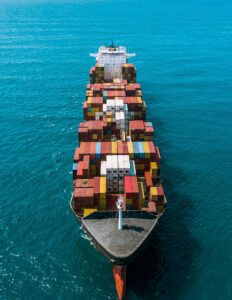Cyprus Mail 17 September 2023 - by Elias Hazou
 |
| A report estimated that the opening of shipping to Turkey would have positive spillover effects on the transport sector, potentially rising from €897million in 2012 to €2.3 billion by 2035 |
Imports of goods made in Turkey have skyrocketed in the last couple of years. And though the direction of trade traffic is lopsided, it looks like the upward trajectory will continue, perhaps amplifying the cliche about how business trumps politics.
In an article published last week, and citing data obtained from the customs department, daily Politis reported how the value of imports from Turkey has increased tenfold and more over the past decade or so.
In 2021 the value stood at €111.1 million, rising to €184.486m in 2022 – compared to €4.6m in 2013 and €10.2m in 2014.
The paper explained that most of the products imported into Cyprus from Turkey are goods produced by foreign companies that maintain factories in the neighbouring country – which is not within the EU and therefore has a cheaper labour force and different legislation.
It added that in most cases Cypriot representatives communicate directly with the central offices of international companies which are in a European country to place their orders. The products are then sent from the factories in Turkey.
The report further stated that Cyprus’ exports to Turkey are limited to just a few million euros annually and are mostly re-exports.
The main products imported from Turkey breakdown as follows: lubricants and mineral oils (€84m in 2021 and €149m in 2022), vehicles and vehicle components (€15m in 2021 and €18.5m in 2022), and machines and machine parts (€3.3m in 2021 and €4.6m in 2022).
Imported boilers and other machinery were valued at €3.3 million in 2021, and €4.6 million in 2022.
Clothes, footwear, textiles and accessories reached €1.9 million in 2021, €2.2 million in 2022.
As for electrical appliances, in 2021 they came to €869,000, and in 2022 to €1.56 million.
Products made of stone, plaster and marble arriving at Cyprus ports were worth €489,000 in 2021, rising to €1.33 million in 2022.
 Medicines imported from Turkey were valued at €460,000 in 2021, going up to €1 million in 2022.
Medicines imported from Turkey were valued at €460,000 in 2021, going up to €1 million in 2022.
Economist Alex Apostolides explains that there exist no barriers to the import of goods from Turkey, as that country has a customs agreement with the EU – which includes Cyprus.
“Turkey is a really big economy right next to us, so these import numbers don’t surprise me,” he comments.
“If anything, you might say that they could be a whole lot higher – after all, €100 million in imports is a drop in the bucket.”
He’s got a point. According to data from the Statistical Service, in 2022 total imports of goods (from the EU and from non-EU countries) amounted to €11.29 billion.
At any rate, the economist puts the interest in ‘made in Turkey’ items down to relatively low labour costs inside Turkey, making the finished products competitive in a market like Cyprus.
The inflation of the Turkish lira also makes these products highly competitive.
And Apostolides anticipates that the volume of trade will increase in coming years.
Professor of political science at the University of Cyprus, Stavros Tombazos, says trade with Turkey – even if mostly one-way – shouldn’t raise any eyebrows:
“We recognise Turkey, there’s no embargo or anything like that, so nothing abnormal to trade with them. Also, it just makes sense for Cypriot importers to buy cheap.”
A former diplomat, who preferred to remain anonymous, had this to say:
“It tells us that entrepreneurship trumps any emotions about Turkey. It’s the law of commerce – businesspeople want to increase their profit.”
Money talks, politics walks? Yes and no. Apostolides flips it around, pointing out how Cyprus misses out on doing far more business with Turkey because of the political situation.
Nicosia recognises Ankara, but not vice versa. That means that Turkey is effectively ‘closed’ to Cypriot shipping.
“With Cyprus being a shipping management hub, imagine how many Turkish goods could be moved through Cyprus as a transit.”
It’s hard to calculate the ‘opportunity cost’. But one can get a proxy for that from research dating to 2014. A report estimated that the opening of shipping to Turkey would have positive spillover effects on the transport sector, potentially rising from €897million in 2012 to €2.3 billion at constant 2012 prices by 2035, yielding an annual average peace dividend of €761 million.
That was based on the working assumption that a settlement of the Cyprus issue was reached in 2016.
Titled ‘The Cyprus Peace Dividend Revisited A productivity and sectoral approach’, the report was authored by Apostolides, Fiona Mullen and Mustafa Besim.
Apostolides is quick to point out that a great deal of items sold in the Republic are in fact manufactured in Turkey.
“Electronic devices, clothes, t-shirts. Lots of t-shirts.”
He jocularly recalls an incident from a season when Nicosia football club Apoel were competing in the Champions League. It turned out the team’s Champions League t-shirts were made in Turkey. Many Apoel fans – known to harbour nationalist sentiments – came unglued on finding out. The local reseller quickly changed the label.
“Or take the Arcelik coffee maker, a known Turkish brand. In Cyprus these gadgets, quite popular, are sold under another brand name.”
That’s an example of a white label agreement. A white label product is one that is produced by one company (the manufacturer) that other companies (marketers) rebrand to make it appear as if they had made it.
Another example is Whirlpool washing machines. Turkey had factories manufacturing these products. And just in January of this year, Whirlpool Corporation announced a deal with the aforementioned Turkish company Arçelik, with the stated goal to create a European home appliance company with revenues of more than €6 billion.